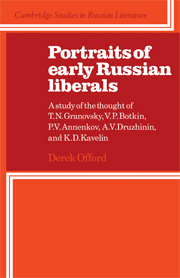 Portraits of Early Russian Liberals
Portraits of Early Russian Liberals Published online by Cambridge University Press: 06 July 2010
Annenkov's contribution to Russian intellectual life
Annenkov's original contribution to Russian letters, like Botkin's, was small, and yet he too played a role in the intellectual life of the 1840s and 1850s that can scarcely be ignored. He is now generally remembered first and foremost as a memoirist and biographer whose account of the intellectual life of the period 1838–48, under the title The Marvellous Decade, and whose writings on the life of N. V. Stankevich, Gogol and Turgenev remain invaluable sources for the student of mid–nineteenth–century Russian culture. (And it is indeed in these fields that Annenkov's creative talents found their freest expression.) But he was also the author of much literary criticism which, though frankly poor in quality and marred by a convoluted literary style, clearly reflected the intellectual currents of the time and indicated the hardening of opposition among the older members of the intelligentsia to the utilitarian view of art encouraged by Chernyshevsky. He wrote a much acclaimed biography of Pushkin which precipitated the controversy of the mid 1850s over the respective merits of Pushkin and Gogol. Furthermore, Annenkov was a gregarious man who by virtue of the breadth of his circle of acquaintances – he met, among other people, Heine and Herwegh, George Sand, Pierre Leroux, Proudhon and the young Marx and Engels – served as an important source of information for his contemporaries on the latest ideas circulating in Western Europe in the 1840s.
To save this book to your Kindle, first ensure [email protected] is added to your Approved Personal Document E-mail List under your Personal Document Settings on the Manage Your Content and Devices page of your Amazon account. Then enter the ‘name’ part of your Kindle email address below. Find out more about saving to your Kindle.
Note you can select to save to either the @free.kindle.com or @kindle.com variations. ‘@free.kindle.com’ emails are free but can only be saved to your device when it is connected to wi-fi. ‘@kindle.com’ emails can be delivered even when you are not connected to wi-fi, but note that service fees apply.
Find out more about the Kindle Personal Document Service.
To save content items to your account, please confirm that you agree to abide by our usage policies. If this is the first time you use this feature, you will be asked to authorise Cambridge Core to connect with your account. Find out more about saving content to Dropbox.
To save content items to your account, please confirm that you agree to abide by our usage policies. If this is the first time you use this feature, you will be asked to authorise Cambridge Core to connect with your account. Find out more about saving content to Google Drive.